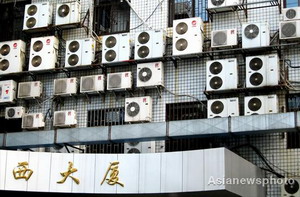Oil plants feel the heat
Updated: 2011-09-02 09:05
By Zhang Xiaomin in Dalian and He Na in Beijing (China Daily)
|
|||||||||||
|
 |
|
Firefighters work to extinguish a blaze that engulfed a section of the China National Petroleum Corp Dalian plant on Monday in Northeast China's Liaoning province. The accident is the latest to hit China's rapidly expanding oil industry, which has come under fire over its safety standards. [Photo / Agencies] |
|
 |
|
The Dalian plant is back to normal after the big fire, which was the fifth major incident in the past 14 months. [Photo / China Daily] |
Recent accidents cause growing alarm, report Zhang Xiaomin in Dalian and He Na in Beijing.
It took 300 firefighters and 50 fire trucks three hours to conquer the blaze on Monday at the Dalian plant of the China National Petroleum Corporation (CNPC).
But despite the fact that the fire no longer posed a threat, Zhang Mo, a plant retiree, remained deeply concerned.
"The fire erupted in the storage area where more than 40 oil tanks of different sizes are located. The smallest one holds 5,000 cubic meters," he said.
"Some liquid gas tanks are not far away. It could have been disastrous."
Jin Yong, the son of a plant retiree, said: "It's the fifth major incident at the plant in just over a year. How many accidents will occur before the company improves plant safety?
"I am anxious because my parents live just across the street." He once planned to sell his parents' apartment and buy another but the selling price was too low.
"Except for the people who work in the plant, who is crazy enough to move here?" he said.
The thick black smoke from the fire eventually dissipated but concerns over safety at petrochemical complexes linger.
Jiang Jiemin, CNPC's general manager, promised to thoroughly investigate the cause of Monday's fire. In a bid to show its determination, the company removed Jiang Fan as general manager of the Dalian plant on Tuesday.
"Every time after an incident, the company swears it will investigate thoroughly to prevent similar incidents," said Ma Jun, director of the nongovernmental Institute of Public & Environmental Affairs. "But the fact is, they never do, they never announce the real reason to the public. I do hope this time the case won't end up with 'nothing conclusive'."
Ma Zhong, director of the school of environment and natural resources at Renmin University of China, said, "It's time for the government to take harsh measures to brace for the environmental problems triggered by these State-owned monopoly enterprises, or else it will be too late."
The fire came just two weeks after 12,000 citizens protested in front of the city government building to demand closure of a paraxylene (PX) chemical plant operated by a different company.
"The frequent incidents at the Dalian plant indicate it has serious problems in management and did not absorb the lessons from the former incidents," Ma Jun said. "The public has the right to know the truth of any incident that threatens their health or lives.
"There are no minor incidents in a high-risk industry," he said. "To raise the safety awareness of every member of the company is the most effective way to reduce safety hazards."
Real plans, penalties
Every high-risk plant is required to have an emergency response plan, "but not all the plants follow the rule," Ma Jun said. "Take last July's incident at the plant, for instance. When the oil tank exploded and needed water to cool the tank, staff members found that the emergency water tap did not have water at all."
Environmental hazards inspections need to be carried out in detail and not be a performance for leaders, he said.
The point can be made, experts said, by raising the penalties for violating the environment and the law.
"Our current cost for unlawful activity is still too low to draw attention," Ma said, especially for an energy monopoly company like CNPC with its large profit margin.
Economic power
Mark China's small and large petrochemical plants on a map, and they will cover almost all 18,000 km of coastline. In many places, such as Tianjin and Liaoning, Hebei and Jiangsu provinces, it's common to find chemical operations doing similar work.
"Since petrochemical projects have an immediate effect in boosting local GDP and expanding revenue, many local officials choose development ahead of environmental protection whether they are suited to the locations or not," Ma said.
"Many petrochemical projects do not have detailed environmental feasibility reports before operation, and these kinds of projects no doubt have major environmental risks," Lu Bin, a professor of urban and environmental sciences at Peking University, was quoted as saying by 21st Century Business Herald.
CNPC's Dalian plant is the only operation in the city with annual sales revenue over 80 billion yuan, so its development plays a decisive role in the local economy. However, Lu said, "Officials need to be cautious in attracting investments, and learn to say no to high-pollution projects."
The situation is similar in other areas around Bohai Bay. Liaoning, Tianjin and Shandong are all on a rapid pace to develop the petrochemical industry.
Early in 2006, what is now the Ministry of Environmental Protection conducted a risk survey of the country's 7,555 petrochemical projects, with some startling results.
It found that 81 percent of the operations were situated in populous areas along the banks of rivers, lakes and oceans, and 45 percent were identified as posing major high risk. At least 1,000 chemical plants were surrounded by residential areas or set upstream from urban drinking water sources.
The malady of such patterns emerged as more incidents - oil spills, chemical leaks and refinery explosions - threatened the safety of the area, said Zheng Husheng, a researcher at Jilin Provincial Academy of Social Sciences. "The irrational layout greatly aggravated harm to cities, rivers and oceans when an incident happened," he said.
Right to the truth
In many foreign countries, choosing a site for a petrochemical plant requires extensive research, surveys and permission from the public, such as surrounding residents. "However, in China, the process is totally different," Ma Jun said.
"The enterprises sign the contract with local government and they began construction. In many cases, it is not until the enterprises have some incidents that the public knows what the companies are producing and whether the process can harm their health and living environment.
"The public has the right to know the facts of public affairs," Ma said, "but in many cases, such as choosing locations for petrochemical companies, people's rights are disfranchised. If governments and enterprises really want to ease mounting tensions with the public, they must guarantee the people's right to learn the truth and let the common people be involved."
Li Jing contributed to this report.














